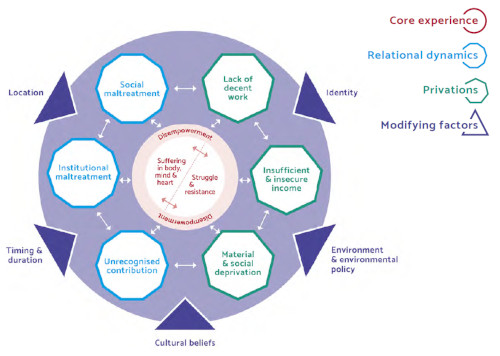The Hidden Dimensions of Poverty
Poverty is multidimensional
What do we really know about poverty?
Poverty is not just a lack of money; it is multidimensional. It affects every aspect of life, from mental and physical health to family and social relationships.
The true face of poverty: ATD Fourth World’s research
ATD Fourth World, in partnership with Oxford University, conducted an international participatory research project: “The Hidden Dimensions of Poverty”. The project took place in six countries: Bangladesh, Bolivia, France, Tanzania, the United Kingdom and the United States over three years.
People with experience of poverty, academics and professionals worked together to design this project, conduct the research and analyse the data, providing a more comprehensive view of this complex issue.
Together, they agreed on 9 dimensions that define poverty:

Disempowerment: A lack of control and dependency on others resulting from severely constrained choices.
Poverty is experienced as lack of control. Options and choices are limited and constrained by life circumstances and the actions of institutions. People experiencing poverty have little margin for error in the choices that they make. Poverty may mean compliance and forced dependence on others resulting in a loss of dignity and dehumanisation. Lack of control with limited choice increases risk and can undermine the chance of getting out of poverty while creating feelings of insecurity and fear.
Suffering in body, mind and heart: Living in poverty means experiencing intense physical, mental and emotional suffering accompanied by a sense of powerlessness to do anything about it.
Lives are shortened by undermining physical and mental health through low-quality housing, inadequate diet and the daily demands of survival. Many people in poverty cannot practice preventive care because they have no access to healthy food, or they live in polluted areas. Both malnutrition and obesity can be prevalent. Poor health caused by multiple privations leaves people physically and emotionally scarred.
Struggle and resistance: There is an on going struggle to survive, which includes resisting and counteracting the effects of the many forms of suffering brought by privations, abuse, and lack of recognition.
Struggling and resisting are intimately linked in people’s efforts to survive, achieve inner balance and to enable themselves, and particularly their children, to have a better life. The struggle takes different forms, many of which remain invisible to the rest of society.
Institutional maltreatment: The failure of national and international institutions, through their actions or inaction, to respond appropriately and respectfully to the needs and circumstances of people in poverty, and thereby to ignore, humiliate and harm them.
Formal institutions, public and private, shape the negative experience of poverty through public discourse and the design and implementation of policy and services; and also, through their neglect of, and failure to listen to people living in poverty. While some institutions are mandated to tackle poverty and improve people’s lives, they frequently fail to do so. Sometimes this means living with the consequences of persistent corruption, government failure to enforce existing policy and law, and unfair distribution of resources and services. It also means having no access to justice.
Social maltreatment: Describes the way that people in poverty are negatively perceived and treated badly by other individuals and informal groups.
The public’s behaviour towards people in poverty is characterized by prejudicial negative judgements, stigma and blame. People living in poverty are often ignored or excluded, while the phenomenon of “othering” (saying or thinking “We’re not like those people”) is commonplace. Sometimes the behaviour is conscious and intentional, other times it is not. Sometimes it results from a lack of understanding of poverty.
Unrecognised contributions: The knowledge and skills of people living in poverty are rarely seen, acknowledged or valued. Often, individually and collectively, people experiencing poverty are wrongly presumed to be incompetent.
People survive through resourcefulness. They find different ways to create goods or services beyond what is expected. Against the odds, they fulfil many important roles, often supporting others and making significant economic and social contributions. However, society ignores such contributions or treats them with indifference, to the point where people in poverty may themselves underestimate their knowledge and skills.
Lack of decent work: Lack of decent work refers to the prevalent experience of being denied access to work that is fairly paid, safe, secure, regulated and dignified.
People in poverty often start working when they are very young, and from this moment they experience exploitation, bad treatment and humiliation. Dignified employment is often scarce, forcing people to accept bad jobs that endanger their health, have no (or very little) positive impact on life trajectories and can add to their insecurity. Few such jobs are regulated or unionised, leaving people vulnerable to various forms of exploitation including sexual abuse, or being fired without warning and payment.
Insufficient and insecure income: This dimension refers to having too little income to be able to meet basic needs and social obligations, to keep harmony within the family and to enjoy good living conditions.
Without sufficient money, people may go into debt to cover basic needs, thereby becoming more dependent on others and at risk of exploitation and greater economic insecurity. Sometimes, adult incomes are so low that their children are forced to work to support the family. This work can put children in physical danger and at risk of abuse.
Material and social deprivation: Refers to a lack of access to the goods and services necessary to live a decent life, participating fully in society.
The necessary resources include: sufficient nutritious food; adequate clothing; affordable, quality housing with good sanitation, clean water, and a reliable energy supply providing security and privacy; non-discriminatory education in well-equipped schools; affordable, accessible and effective health and dental care; serviceable public transport; and non-hazardous environments. Lack of access to these resources means that individuals, families, and communities are unable to meet daily needs, live with dignity, or have sufficient quality time for family or personal growth. It also means children being denied the possibility to grow and develop normally.


